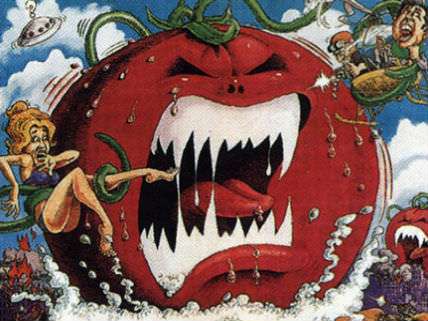Anti-GMO Activist Campaign is "Full of Errors, Fallacies, Misconceptions, Misrepresentations, and Lies."
Terrific Slate article agrees with what Reason has been reporting for years now.

Better late than never, Slate is running a terrific article, "Unhealthy Fixation," denouncing the massive campaign of pseudoscientific disinformation and lies perpetrated by environmental and organic activists against genetically enhanced crops. Astute Reason readers will be well aware of the data and arguments made in the Slate article, such as, the lies activists tell about biotech safety; why mandatory GMO labeling is a bad idea; how anti-biotech activism kills and blinds kids; the mendacious campaign against GMOs in Hawaii; and the fact that organic crops are not healthier or better for the planet.
The Slate article's subhed, however, sums up the arguments well:
The war against genetically modified organisms is full of fearmongering, errors, and fraud. Labeling them will not make you safer.
Well, yes. In any case, Slate's Will Saletan reports:
I've spent much of the past year digging into the evidence. Here's what I've learned. First, it's true that the issue is complicated. But the deeper you dig, the more fraud you find in the case against GMOs. It's full of errors, fallacies, misconceptions, misrepresentations, and lies. The people who tell you that Monsanto is hiding the truth are themselves hiding evidence that their own allegations about GMOs are false. They're counting on you to feel overwhelmed by the science and to accept, as a gut presumption, their message of distrust.
Second, the central argument of the anti-GMO movement—that prudence and caution are reasons to avoid genetically engineered, or GE, food—is a sham. Activists who tell you to play it safe around GMOs take no such care in evaluating the alternatives. They denounce proteins in GE crops as toxic, even as they defend drugs, pesticides, and non-GMO crops that are loaded with the same proteins. They portray genetic engineering as chaotic and unpredictable, even when studies indicate that other crop improvement methods, including those favored by the same activists, are more disruptive to plant genomes. …
… the fundamental flaw in the anti-GMO movement [is that] it only pretends to inform you. When you push past its dogmas and examine the evidence, you realize that the movement's fixation on genetic engineering has been an enormous mistake. The principles it claims to stand for—environmental protection, public health, community agriculture—are better served by considering the facts of each case than by treating GMOs, categorically, as a proxy for all that's wrong with the world. That's the truth, in all its messy complexity. Too bad it won't fit on a label. …
The relentless efforts of Luddites to block testing, regulatory approval, and commercial development of GMOs are major reasons why more advanced GE products, such as Golden Rice, are still unavailable. The best way to break the herbicide industry's grip on genetic engineering is to support the technology and push it forward, by telling policymakers, food manufacturers, and seed companies that you want better GMOs.
The whole article is well worth your attention.
Note: I will mention that readers who seek a more extensive treatment of these issues might want to take a look at my new book, The End of Doom: Environmental Renewal in the Twenty-First Century (St. Martin's Press, July 21). I have a chapter, "The Attack of the Killer Tomatoes?" in which I report the data on biotech crops and debunk activist disinformation, and another "Never Do Anything for the First Time" in which I explain the powerful threat to innovation posed by the precautionary princple.


Show Comments (192)